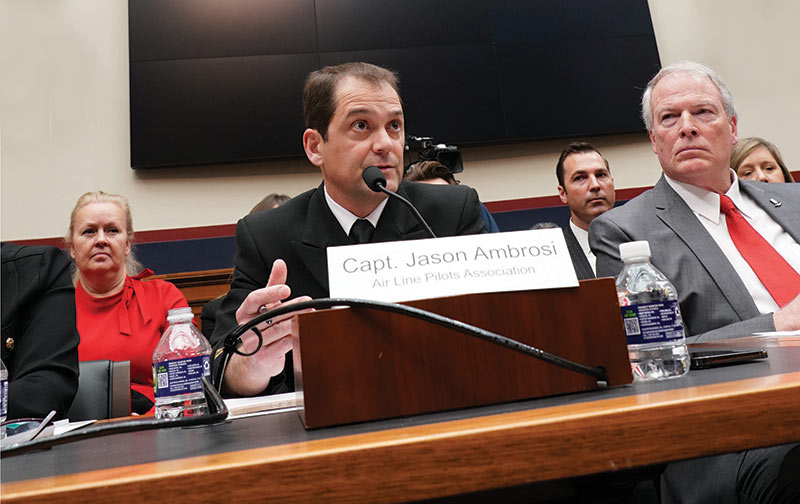ALPA President Urges Congress to Prioritize Aviation Safety
By John Perkinson, Senior Staff Writer

Capt. Jason Ambrosi, ALPA’s president, testifies during the “FAA Reauthorization: Enhancing America’s Gold Standard in Aviation Safety” hearing.
In his first visit to Capitol Hill to address Congress since taking office, Capt. Jason Ambrosi, ALPA’s president, cited the Feb. 12, 2009, Colgan Air Flight 3407 crash near Buffalo, N.Y., as a major catalyst for change in U.S. aviation safety. The resulting NTSB report underscored the need to enhance airline pilot training and qualification standards.
Testifying before a February 7 House Committee on Transportation and Infrastructure hearing titled “FAA Reauthorization: Enhancing America’s Gold Standard in Aviation Safety,” Ambrosi praised the subsequent improvements in these specific areas as part of the Airline Safety and Federal Aviation Administration Extension Act of 2010.
“It’s no accident that the airline passenger fatality rate has dropped by 99.8 percent since the law was passed in 2010,” Ambrosi stated. “This extraordinary record demonstrates that the current system is working in the way it was intended. The United States is creating thousands of new pilots each year who have the experience and training they need to ensure this nation maintains its place as the global safety leader.”
The current authorization statute for the FAA is due to expire on September 30, and this hearing, held in the Rayburn House Office Building, was an opportunity for aviation stakeholders, like ALPA, to examine the current legislation and make recommendations for a future bill.
In his testimony, Ambrosi praised the ongoing, collaborative efforts of labor, the aviation industry, and government, drawing special attention to safety programs like the Commercial Aviation Safety Team and Aviation Safety Information Analysis and Sharing. He described them as “game changers that apply state-of-the-art analytics to aviation and position the United States on the leading edge of safety analysis.”
While working together with all aviation stakeholders must remain a priority, Ambrosi cautioned, “Any new technology, system, or change in procedure or regulation must maintain or improve the current level of safety.”
ALPA’s president encouraged Congress to do more, asserting, “We thank the committee for passing the Aircraft Certification Reform bill to improve the entire aircraft certification system. Continuing to modernize the air traffic infrastructure and NOTAM [Notice to Air Missions] system is also important.” He added, “We urge lawmakers to consider modernization funding that spans multiple reauthorization and appropriation cycles so that the FAA has stable, long-term resources to increase aviation safety and efficiency.”
During the ensuing question-and-answer period, nearly a dozen committee members queried Ambrosi about a host of issues, including the recent operational shutdown prompted by an issue with the NOTAM system. Rep. Valerie Foushee (D-NC) asked Ambrosi about efforts to attract the next generation of pilots and the need for greater diversity in the profession. He responded, explaining ALPA’s push to promote a more diverse workforce and to encourage more young people to consider flying as a career.
However, ALPA’s president acknowledged the considerable cost associated with becoming an airline pilot and how that reality bars many from making this career choice. Ambrosi highlighted educational funding programs currently available for other professions to encourage policy makers to consider federal legislation to provide student loans for those pursuing airline piloting jobs. Doing so would likely generate greater interest in airline flying and, ultimately, “a more diverse workforce,” he said.
When asked about reducing pilot qualification standards as a possible means to increase the supply of job applicants, Ambrosi adamantly stated, “We’re in the safest period of aviation right now and a lot of that is because of this very rule.”
Recalling the days before the landmark 2010 legislation, Ambrosi noted, “I was a captain at a regional airline flying a 30-passenger turboprop with pilots who had 250 to 500 hours as new hires…. The traveling public doesn’t deserve to have on-the-job training in an airliner.”
In his opening remarks, Transportation and Infrastructure Committee Chair Sam Graves (R-MO) readily acknowledged, “In 11 of the past 13 years, there have been no passenger fatalities on scheduled domestic passenger flights, despite the fact that passenger ridership has increased by 50 percent between 2002 and 2019.”
Others providing testimony for the hearing included Acting FAA Associate Administrator Dave Boulter, NTSB Chair Jennifer Homendy, and senior executives from the General Aviation Manufacturers Association, the National Business Aviation Association, and the MITRE Corporation.

